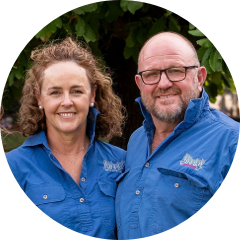Solutions for emissions reduction in livestock
Term
2024-2027
Project Officer
Sayra Samudio
WHY THIS PROJECT IS NEEDED
The livestock sector faces growing pressure to reduce greenhouse gas emissions while maintaining productivity and profitability. Methane from the digestive process of livestock (enteric methane) accounts for the majority of Australia’s agricultural emissions.
Feed additives are one of the most promising strategies to reduce methane emissions in ruminants, with research showing some feed additives can reduce methane emissions by over 80% under ideal conditions. However, more on-farm evidence is needed to understand their practical impact under commercial conditions.
WHAT THIS PROJECT WILL DO
Riverine Plains, in collaboration with the University of Melbourne, is conducting a six-month feeding trial on a commercial sheep property to evaluate two feed additives—Agolin and Polygain—both individually and in combination.
Agolin is a proprietary blend of plant-based essential oils that may enhance digestion and animal performance, while also showing potential to reduce methane emissions by modulating rumen fermentation. Polygain is a sugarcane-derived liquid supplement rich in polyphenols, which may improve feed efficiency and lower enteric methane production.
The trial will assess impacts on:
- Enteric methane emissions
- Lamb growth rates and productivity
- On-farm management implications
- Potential for carbon project participation
Data will be collected using innovative technologies including in-paddock weight monitoring and methane measurement tools.
This trial focuses on additives that are currently accessible and practical for use in southern sheep grazing systems. While products like Asparagopsis and 3-NOP (Bovaer®) show strong methane-reduction potential, they are not yet widely available or suited to broadscale grazing operations and are not included in this trial.
PROJECT FOCUS
The trial will involve:
- 200 weaned lambs (wethers or ewes) of the same breed and age
- Four treatments: Control (no additive), Agolin®, Polygain®, Agolin® + Polygain®
- Feedlot-style containment during GreenFeed measurement phase
- GreenFeed methane measurements across six campaigns per group over 12 weeks
An Optiweigh unit will be used to assess weight gain over the course of the trial.
Throughout the trial, University of Melbourne scientists will lead the measurement program, supported by Riverine Plains staff.
Find out more
For further information about this project, please contact Riverine Plains Project Officer, Sayra Samudio at sayra@riverineplains.org.au.
Project investment
Partners
Focus areas
MORE ON Livestock & Sustainability
Our research enhances food production, increases environmental resilience and improves community connection across the Riverine Plains. See how our research creates impact.
-
Grains
Sustainability
-
Business
Sustainability
-
Grains
Sustainability
-
Grains
Livestock
-
Grains
Livestock
-
Soils
Sustainability
-
Soils
Sustainability
-
Grains
Sustainability
-
Drought
Livestock
-
Sustainability
Drought
-
Sustainability
-
Grains
Sustainability
-
Drought
Livestock
-
Livestock
Fodder
-
Soils
Sustainability
-
Livestock
Drought
-
Drought
Livestock
-
Drought
Livestock
-
Soils
Sustainability
-
Soils
Sustainability
-
Sustainability
Grains
-
Grains
Sustainability
-
Grains
Sustainability
-
Livestock
Grains
-
Sustainability
Grains
JOIN RIVERINE PLAINS
Riverine Plains provides opportunities to see new research and innovation, connect with rural communities, and attend informative events.


